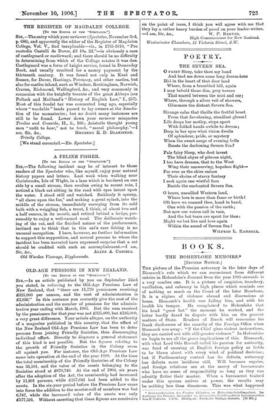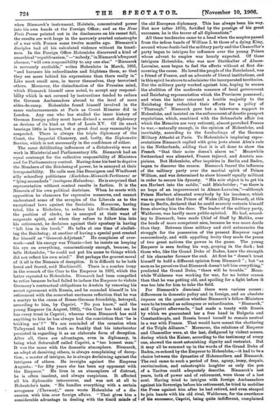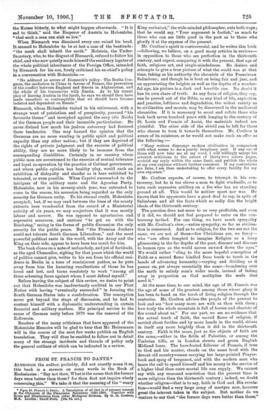BOOKS.
THE HOHENLOHE MEMOIRS.* [SECOND NOTICE.] THE picture of the Prussian autocracy in the later days of Bismarck's rule which we can reconstruct from different entries in Hohenlohe's Journal from the year 1885 onwards is a very sombre one. It is a picture of suspicion, treachery, vacillation, and calumny in high places which reminds one of nothing so much as the Court of the later Bourbons. It is a regime of violence abroad and dissensions at home. Bismarck's health was failing him, and with his health his temper. He complained to Hohenlohe that his bead "grew hot" the moment he worked, and the latter hardly dared to dispute with him on the gravest matters of State. Readers of Busch will remember his frank disclosures of the anarchy of the Foreign Office when Bismarck was away : "if the Chief gives violent instructions, they are carried out with still greater violence." In Hobenlobe we begin to see all the grave implications of this. Bismarck, with what Lord Odo Russell called his passion for authority, was fond of sneering at English foreign policy as liable to be blown about with every wind of political doctrine ; but if Parliamentary control has its defects, autocracy has defects more insidious still. Will becomes caprice, and foreign relations are at the mercy of bureaucrats who have no sense of responsibility so long as they can adroitly flatter their master. When a bureaucrat trained under this system arrives at power, the results may be nothing less than disastrous. This was what happened
Denkteardigkeiten des Parsten Cidedirig LII Hollesdohs-Schillingsfarst. ha Auttaige dem Priuzen Alexander zu llohenlohe-SchillinotUrst herausgegeben von F. Curtius. 2 Bele. Stuttgart : Deutsche VerlavrAuxtalt. [25 Mk.]
when Bismarck's instrument, Holstein, concentrated power into his own hands at the Foreign Office; and as the Neue Freie Presse pointed out in its disclosures on his recent fall, the results are writ large in the narrowly averted catastrophe of a war with France some twelve months ago. Bismarck's disciples had all his calculated violence without its timeli- ness. In the Foreign Office Hohenlohe discovered a kind of anarchical" republicanism,"—" nobody," in Bismarck's frequent absence, "will own responsibility to any one else." "Bismarck is nervously excitable," writes Hobenlohe in March, 1885, "and harasses his subordinates and frightens them, so that they see more behind his expressions than there really is." Like most small men, in terror themselves, they terrorised others. Moreover, the disinclination of the Prussian mind, which Bismarck himself once noted, to accept any responsi- bility which is not covered by instructions tended to reduce the German Ambassadors abroad to the level of mere aides-de-camp. Hohenlohe found himself involved in the same embarrassments at Paris as Count Miinster did in London. Any one who has studied the inner history of German foreign policy must have divined a secret diplomacy as devious of its kind as that of Louis XV. Of its exact bearings little is known, but a great deal may reasonably be suspected. There is always the triple diplomacy of the Court, the Imperial Chancery, and, lastly, the Diplomatic Service, which is not necessarily in the confidence of either.
The same debilitating influences of a dictatorship were at work in Ministerial and Parliamentary life. Bismarck had an equal contempt for the collective responsibility of Ministers and for Parliamentary control. Having done his best to deprive the Members of the Reichstag of power, he is annoyed at their irresponsibility. He calls men like Bennigsen and Windhorst silly schoolboy politicians (Karlehen-Miesnick-Tertianen) or "lying scoundrels" (verlogene Halunken). He is surprised that representation without control results in faction. It is the Nemesis of his own political doctrines. When he meets with opposition he clamours for repressive measures, and cannot understand some of the scruples of the Liberals as to the exceptional laws against the Socialists. Moreover, having tried, like a Richelieu, to reduce his fellow-Ministers to the position of clerks, be is annoyed at their want of corporate spirit, and when they refuse to follow him into his retirement, he declaims against their apostasy in having " left him in the lurch." He talks at one time of abolish- ing the Reichstag; at another of having a special post created for himself as ' General-Adjutant" He complains of over- work—and his energy was Titanic—but be insists on keeping his eye on everything, conscientiously enough, because, he tells Hohenlohe, "he could not put his name to things which did not reflect his own mind." But perhaps the gravest moral of it all is the Nemesis of deception. It is difficult to be both loved and feared, said Machiavelli. There is a sombre irony in the remark of the Czar to the Emperor in 1892, which the latter repeated to Holienlolie. Bismarck had been compelled to retire because he had failed to induce the Emperor to violate Germauy's contractual obligations to Austria by renewing his secret agreement with Russia, and he consoled himself in his retirement with the somewhat unctuous reflection that he was a martyr to the cause of Russo-German friendship, betrayed, according to him, by Caprivi. "Do you know," said the young Emperor (in August, 1892), "the Czar has told me he has every trust in Caprivi; whereas when Bismarck has said anything to him he has always bad the conviction that 'he is tricking me' P" We are reminded of the occasion when Talleyrand told the truth so frankly that his interlocutor persisted in regarding it as an elaborate form of deception. After all, there are advantages, even in diplomacy, in being what Schuvaloff called Caprivi, a "too honest man." It was the same with the domestic atmosphere. Bismarck, an adept at deceiving others, is always complaining of decep- tion; a master of intrigue, he is always declaiming against the intrigues of others. He inveighs against the Empress Augusta : "for fifty years she has been my opponent with the Emperor." He lives in an atmosphere of distrust, he is often insolent, and always auspicious. It affected all his diplomatic intercourse, and was not at all to Hohenlohe's taste. "He handles everything with a certain arrogance (thermal)," once wrote Hohenlohe of a dis- cussion with him. over foreign affairs. "That gives him a considerable advantage in dealing with the timid minds of the old European diplomacy. This has always been his way. But now (after 1870), fortified by the prestige of his great successes, be is the terror of all diplomatists."
All these tendencies came to a head when the sceptre passed from the infirm hands of William I. to those of a dying King, around whose death-bed the military party and the Chancellor's party began to intrigue for influence over the young Prince whose advent to empire was hourly expected. Of these intrigues Hohenlohe, who was now Statthalter of Alsace- Lorraine, soon began to feel the effects without at first dis- covering the cause. He loved the people of the Reichsland, was a friend of France, and an advocate of liberal institutions, and in this spirit he strove to administer the incorporated territories. But the military party worked against him, hoping to secure the abolition of the moderate measure of local government and Reichstag representation which the Provinces possessed ; and when the latter returned a hostile majority to the Reichstag they redoubled their efforts for a policy of "Thorough." Bismarck gave but a lukewarm support to Hohenlohe, and insisted on the enforcement of drastic passport regulations, which, combined with the Sehnaebele affair (on which the Memoirs are very reticent), almost provoked France to war,—naturally enough, in the opinion of Hohenlobe, and inevitably, according to the forebodings of the German Military Attache at Paris. To Hobenlohe's imploring repre- sentations Bismarck replied with grim jests about Alva's rule in the Netherlands, adding that it is all done to show the French "that their noise doesn't alarm us." Meanwhile Switzerland was alienated, France injured, and Austria sus- picious. But Hohenlohe, after inquiries in Berlin and Baden, began to discover the reason. Bismarck feared the influence of the military party over the martial spirit of Prince William, and was determined to show himself equally militant in order to secure his dynasty. "His sole object is to get his son Herbert into the saddle," said Bleichroder ; "so there is no hope of an improvement in Alsace-Lorraine,"—although Prince Herbert alienated everybody by his insolence, whiolt was so gross that the Prince of Wales (King Edward), at this time in Berlin, declared that he could scarcely restrain himself from showing him the door. The leader of the military party, Waldersee, was hardly more public-spirited. He bad, accord- ing to Bismarck, been made Chief of Staff by Moltke, over the heads of more competent nien, because be was more docile than they. Between these military and civil autocracies the struggle for the possession of the present Emperor raged remorselessly, and with appalling levity they made the peace of two great nations the pawns in the game. The young Emperor is seen feeling his way, groping in the dark ; but those who, like the Grand Duke of Baden, knew the strength of his character foresaw the end. At first he " doesn't trust himself to hold a different opinion from Bismarck " ; but "as soon as he perceives that Bismarck doesn't tell him everything," predicted the Grand Duke, "there will be trouble." Mean- while Waldersee was working for war, for no better reason than that be was getting old, and spoiling for a fight before it was too late for him to take the field.
For Bismarck's dismissal there were various causes : differences in domestic policy and in foreign, and an absolute impasse on the question whether Bismarck's fellow-Ministers were to be treated as colleagues or subordinates. "Bismarck," said Caprivi afterwards, "had made a treaty with Russia by which we guaranteed her a free hand in Bulgaria and Constantinople, and Russia bound herself to remain neutral in a war with France. That would have meant the shattering of the Triple Alliance." Moreover, the relations of Emperor and Chancellor were, at the last, disfigured by violent scenes, during which the Kaiser, according to the testimony of every one, showed the most astonishing dignity and restraint. But it may all be summed up in the words of the Grand Duke of Baden, re-echoed by the Emperor to Hohenlohe,—it had to be a choice between the dynasties of Hohenzollern and Bismarck. The end came to such a period of fear, agony, irony, despair, recrimination, and catastrophic laughter as only the pen of a Tacitus could adequately describe. Bismarck's last years, both of power and of retirement, were those of a lost soul. Having tried to intrigue with foreign Ambassadors against his Sovereign before his retirement, he tried to mobilise the Press against him after he had retired, and even stooped to join hands with his old rival, Waldersee, for the overthrow of his successor, Caprivi, being quite indifferent, complained
the Kaiser bitterly, to what might happen afterwards. "It is sad to think," said the Emperor of Austria to Hohenlohe,
"that such a man can sink so low."
When Bismarck was dismissed every one raised his bead.
It seemed to Hohenlohe to be at last a case of the beatitude : "the meek shall inherit the earth." Holstein, the -Under- Secretary, who, to the disgust of Bismarck, refused to follow his
chief, and who now quietlymade himself the residuary legatee of the whole political inheritanoe of the Foreign Office, intended by Bismarck for his son, freely criticised his ex-chief's policy in a conversation with Hohenlohe
"He adduced as errors of Bismarck's policy : The Berlin Con- gress, the mediation in China in favour of France, the prevention of the conflict between England and Russia in Afghanistan, and the whole of his tracasseries with Russia. As to his recent plan of leaving Austria, in the lurch, he says we should then have made ourselves so contemptible that we should have become isolated and dependent on Russia."
Bismarck, whom Hohenlohe visited in his retirement, with a strange want of patriotism and of perspicuity, pursued "his favourite theme" and inveighed against the envy (die Neide)
of the German people and their incurable particularism He never divined how much his jealous autocracy had fostered these tendencies. One may hazard the opinion that the Germans are no more wanting in public spirit and political capacity than any other nation ; but if they are deprived of the rights of private judgment and the exercise of political ability, they are no more likely to be immune from the corresponding disabilities. Certainly in no country where public men are accustomed to the exercise of mutual tolerance and loyal co-operation by the practice of Cabinet government, and where public opinion has healthy play, would such an exhibition of disloyalty and slander as is here exhibited be tolerated, or even possible. When Caprivi succumbed to the intrigues of the military caste and the Agrarian Party, Hohenlohe, now in his seventy-sixth year, was entreated to come to the rescue, his accession being regarded as the only security for German unity. To his eternal credit, Hohenlohe accepted ; but, if we may read between the lines of the scanty extracts here vouchsafed from the record of a Ministerial activity of six years, we may conjecture that it was mostly
labour and sorrow. He was opposed to agrarianism and repressive measures, and anxious "to get on with the Reichstag," seeing in the forms of public discussion the only security for the public peace. But "the Prussian Junkers could not tolerate South German Liberalism," and the most powerful political caste in the world, with the Army and the King on their side, appear to have been too much for him.
The book closes on a note of melancholy, and yet of fortitude, as the aged Chancellor, sighing for that peace which the world of politics cannot give, writes to his son from his official resi- dence in Berlin in a tone of reminiscent pathos, as he puts away from him the haunting recollections of those he has loved and lost, and turns resolutely to work "among all these scheming faces against whom I must defend myself." Before leaving the subject of this review, we desire to point out that Hohenlohe was inadvertently credited in our First Notice with having "eventually succeeded" in forming the South German States into a confederation. The conception never got beyond the stage of discussion, and he had to content himself with a diplomatic understanding in certain financial and military matters. His principal service to the cause of German unity before 1870 was the renewal of the Zollverein.
Readers of the many criticisms that have appeared of the Hohenlohe Memoirs will be glad to hear that Mr. Heinemann will in the course of the next few weeks publish an English translation. They will thus be enabled to follow out in detail many of the strange incidents and threads of policy only the general outlines of which can be indicated in a review.
















































 Previous page
Previous page